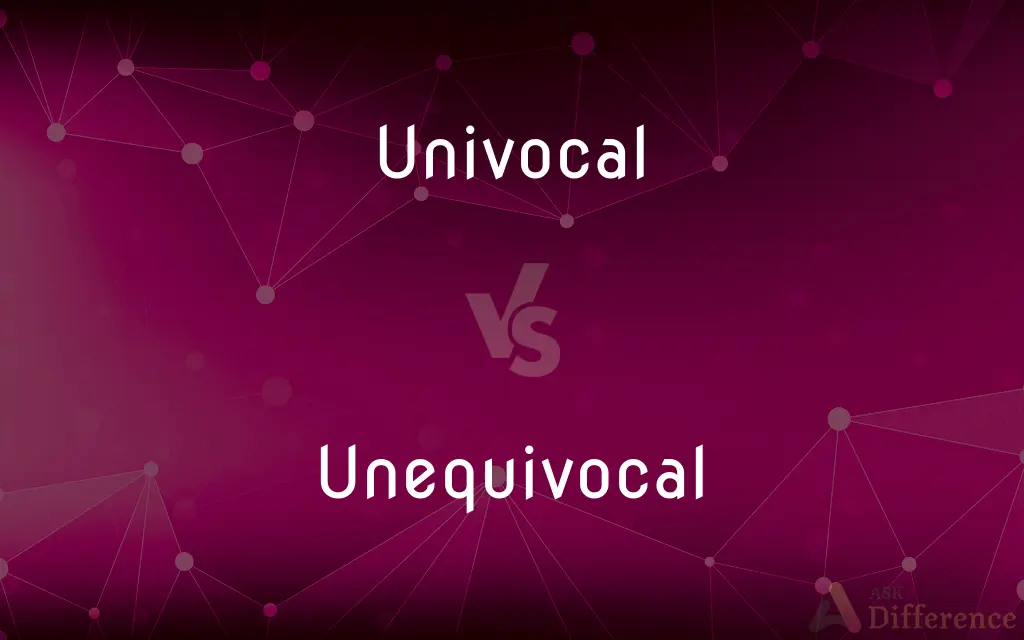Univocal vs. Unequivocal — What's the Difference?
By Tayyaba Rehman & Urooj Arif — Updated on April 24, 2024
Univocal terms have a single, unambiguous meaning, while unequivocal expressions convey clarity and leave no room for doubt or misunderstanding.

Difference Between Univocal and Unequivocal
Table of Contents
ADVERTISEMENT
Key Differences
Univocal terms refer specifically to words or expressions with only one meaning, making them clear in communication and interpretation. On the other hand, unequivocal pertains to statements or assertions that are expressed so clearly and strongly that they leave no room for doubt or ambiguity.
Univocal is often used in the context of linguistics and semantics to describe terms that cannot be misunderstood because of their singular interpretation. Whereas, unequivocal is more broadly applicable in everyday language, emphasizing the absolute clarity and indisputable nature of a statement or response.
The use of univocal is crucial in fields like philosophy and logic, where precise terminology is essential to avoid confusion and ensure accurate understanding. In contrast, unequivocal finds its importance in legal, diplomatic, and personal communication, where clear, firm responses are necessary.
When a word is described as univocal, it suggests a limitation in its usage and flexibility, confined to a specific interpretation. However, describing a statement as unequivocal often highlights its strength and the speaker's commitment to the clarity of their message.
Univocal terms are integral in creating straightforward definitions and explanations, especially in academic and technical settings. Conversely, unequivocal language is vital in negotiations or declarations where asserting certainty and avoiding misunderstandings is paramount.
ADVERTISEMENT
Comparison Chart
Definition
Having only one meaning
Leaving no doubt; clear and definitive
Usage Context
Linguistics, semantics
Everyday language, legal discussions
Purpose
Avoid misunderstanding in specific terms
Assert clarity and certainty in statements
Implication in Communication
Limited flexibility, precise
Strong, committed, and clear
Field of Importance
Philosophy, logic
Diplomacy, legal matters
Compare with Definitions
Univocal
Lacking ambiguity in semantics.
Sunrise is a univocal term describing the daily first appearance of the sun.
Unequivocal
Not capable of being misunderstood or misinterpreted.
Her agreement was expressed in terms so unequivocal that no further discussion was necessary.
Univocal
Expressions that cannot be interpreted in more than one way.
In medical terminology, certain conditions are described with univocal terms.
Unequivocal
Clear and unambiguous in expression or style.
The leader’s statement was unequivocal in denouncing the actions.
Univocal
Terms used specifically in technical or philosophical contexts.
Substance in philosophy is often considered a univocal concept.
Unequivocal
Statements that are forcefully clear.
His support for the policy was unequivocal.
Univocal
Pertaining to words that signify only one meaning.
The term bachelor is univocal in referring to an unmarried man.
Unequivocal
Expressions that are definitive and resolute.
The command given was unequivocal, allowing no disobedience.
Univocal
Words with a fixed and single interpretation.
The word quinquennial univocally means occurring every five years.
Unequivocal
Leaving no room for doubt or uncertainty.
The evidence presented at the trial was unequivocal.
Univocal
Having only one meaning; unambiguous.
Unequivocal
Admitting of no doubt or misunderstanding; clear and unambiguous
An unequivocal success.
Univocal
A word or term having only one meaning.
Unequivocal
Unambiguous; without equivocation or ambiguity; singularly clear, unmistakable, or unquestionable
I want you to give me an unequivocal guarantee on that.
Univocal
Having only one possible meaning.
Unequivocal
Without equal, matchless.
The unequivocal scope of the Golden Gate Bridge
Univocal
Containing instances of only one vowel; univocalic.
Unequivocal
Not equivocal; not doubtful; not ambiguous; evident; sincere; plain; as, unequivocal evidence; unequivocal words.
Univocal
Having unison of sound, as the octave has in music.
Unequivocal
Admitting of no doubt or misunderstanding; having only one meaning or interpretation and leading to only one conclusion;
Unequivocal evidence
Took an unequivocal position
An unequivocal success
An unequivocal promise
An unequivocal (or univocal) statement
Univocal
Having always the same drift or tenor; uniform; certain; regular.
Unequivocal
Clearly defined or formulated;
The plain and unequivocal language of the laws
Univocal
Unequivocal; indubitable.
Univocal
A word having only one meaning.
Univocal
A document containing instances of only one vowel.
Univocal
Having one meaning only; - contrasted with equivocal.
Univocal
Having always the same drift or tenor; uniform; certain; regular.
Univocal
Unequivocal; indubitable.
Univocal
A generic term, or a term applicable in the same sense to all the species it embraces.
Univocal
A word having but one meaning.
Univocal
Admitting of no doubt or misunderstanding; having only one meaning or interpretation and leading to only one conclusion;
Unequivocal evidence
Took an unequivocal position
An unequivocal success
An unequivocal promise
An unequivocal (or univocal) statement
Common Curiosities
How does univocal differ from ambiguous?
Univocal terms have one specific meaning, whereas ambiguous terms can have multiple interpretations.
What is an example of an unequivocal statement?
"I will not tolerate any form of dishonesty" is an example of an unequivocal statement.
Can a statement be both univocal and unequivocal?
Yes, a statement can be both univocal (single-meaning) and unequivocal (clearly stated) if it is expressed clearly and has only one interpretation.
Is univocal usage more common in certain fields?
Yes, univocal usage is prevalent in fields like philosophy, where precise meanings are crucial.
Why is unequivocal communication important in legal contexts?
Unequivocal communication prevents misunderstandings and ensures clear, unambiguous understanding in legal matters.
Can an unequivocal statement be misinterpreted?
By nature, unequivocal statements are designed to be clear enough that they cannot be easily misinterpreted.
What are the advantages of using unequivocal language in diplomacy?
In diplomacy, using unequivocal language helps convey clear messages and positions to avoid conflicts.
What does univocal mean in linguistics?
Univocal terms in linguistics are those that have a single, unchangeable meaning.
How do univocal terms support effective communication?
They reduce confusion by limiting the interpretation of terms to a single, clear meaning.
What makes a term unequivocal in everyday conversation?
A term becomes unequivocal when it is expressed so clearly that it leaves no room for misinterpretation.
Does the clarity of an unequivocal statement affect negotiations?
Yes, the clarity of an unequivocal statement can lead to more straightforward and efficient negotiations.
Can univocal terms be considered limiting in creative writing?
While univocal terms provide clarity, they can be limiting in creative contexts where ambiguity might be stylistically desired.
How does univocal terminology assist in academic research?
Univocal terminology ensures that academic discussions and writings are understood precisely and consistently.
What role does unequivocal expression play in leadership?
Leaders use unequivocal expressions to set clear expectations and directives.
How do unequivocal assurances impact trust in relationships?
Unequivocal assurances can significantly enhance trust by providing clear and decisive commitments.
Share Your Discovery

Previous Comparison
Roebuck vs. Deer
Next Comparison
Vest vs. WaistcoatAuthor Spotlight
Written by
Tayyaba RehmanTayyaba Rehman is a distinguished writer, currently serving as a primary contributor to askdifference.com. As a researcher in semantics and etymology, Tayyaba's passion for the complexity of languages and their distinctions has found a perfect home on the platform. Tayyaba delves into the intricacies of language, distinguishing between commonly confused words and phrases, thereby providing clarity for readers worldwide.
Co-written by
Urooj ArifUrooj is a skilled content writer at Ask Difference, known for her exceptional ability to simplify complex topics into engaging and informative content. With a passion for research and a flair for clear, concise writing, she consistently delivers articles that resonate with our diverse audience.














































